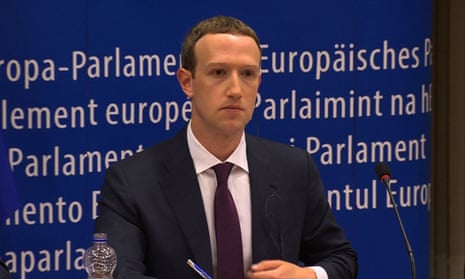If you’re looking for a handy guide to what, exactly, happened today (and even if you watched the whole thing, you may want that question answered), my colleague Jennifer Rankin has the wrap.
Mark Zuckerberg appears before European parliament – as it happened

Live feed
Damian Collins, chair of the DCMS committee, repeats his frustration at the hearing:
What a missed opportunity for proper scrutiny on many crucial questions raised by the MEPs. Questions were blatantly dodged on shadow profiles, sharing data between WhatsApp and Facebook, the ability to opt out of political advertising and the true scale of data abuse on the platform.
Unfortunately, the format of questioning allowed Mr Zuckerberg to cherry-pick his responses and not respond to each individual point.
I echo the clear frustration of colleagues in the room who felt the discussion was shut down. It is time that Mr Zuckerberg agreed to appear in front of the DCMS committee to provide Facebook users the answers they deserve.
What we learned

- The European Parliament format is a terrible way to elicit answers from one of the most powerful people in the world.
- Zuckerberg would like to make it clear that he is very, very sorry about how his platform has been used for nefarious purposes.
- Facebook’s social media dominance is under threat from MEPs who made it clear that they consider it to be an uncompetitive monopoly.
- Nigel Farage is very concerned about the impact Facebook’s recent algorithm changes could have on his ability to reach the public.
- Zuckerberg lived to fight another day without making any substantial pledge to change the way Facebook operated.
Reaction is coming in from observers, and, well, few of them think we witnessed a shining example of European democracy.
Damian Collins, head of the DCMS committee:
54 minutes into the European Parliament's session with Mark Zuckerberg and he has not answered a single question. It is clear why he refused to appear in front of @CommonsCMS
— Damian Collins (@DamianCollins) May 22, 2018
Lukusz Olejnik, privacy expert:
Not sure if the intent of the European Parliament was offering space and time to improve the image of Facebook following the Congressional hearing, but it worked. At a reasonable price. FB policy people are qualified indeed (not speaking of security/privacy policy folks) https://t.co/QlMwkKNzwv
— Lukasz Olejnik (@lukOlejnik) May 22, 2018
MEPs left frustrated by stonewalling – and procedural roadblocks
European parliamentarians were left unsatisfied following a lengthy Q&A session with Facebook’s Mark Zuckerberg, as the chief executive took advantage of the odd format of the session – which saw each question asked back to back, before Zuckerberg answered them in one block – to avoid giving any specifics.
More than two-thirds of the 90-minute meeting was spent on the questions, as the heads of each European party were offered their spot in the limelight, as well as a number of others from around the parliament. When the questioning finally ended, with just seven minutes to go until the scheduled end of the event, Zuckerberg responded in broad strokes, promising to cover the specific details of each question with follow-ups later on.
Even angry interventions from some MEPs as the Facebook founder was preparing to leave couldn’t spark a substantial response, with the president of the EP, Antonio Tajani, eventually intervening to declare that time had run out, and that Zuckerberg would only be required to provide written answers at his leisure.
And that’s it: Zuckerberg stands and leaves the room, as the MEPs huddle and commiserate with each other about the lack of a real debate.
Procedural squabbles! A surprise final question, from Albrecht, asking again whether Facebook will commit to separating data from WhatsApp and Facebook; and another from Lamberts, the Green, asking again whether Zuckerberg will promise the ability to opt out from targeted advertising.
But Zuckerberg refuses to answer the questions, promising to get to them in writing, and is backed up by Tajani, who ultimately cuts off the MEPs trying to get their specific questions answered.
Zuckerberg is wrapping up with his standard promise to “follow up with each of you after … We’re going to have someone come to do a full hearing after.”
On whether there will be more Cambridge Analyticas: “The good news with Cambridge Analytica is that the changes we made back in 2014 would prevent – it wouldn’t be possible for an app developer to get access to that level of data.
“But because there were a lot of apps using the data in 2014, we think it’s good to go back and investigate the apps that got access to a lot of data before we locked down the platform. I do anticipate that there are going to be other apps that we’ll find that we want to take down.
“This is part of our shift towards not just trying to manage the system reactively. Now what we’re doing is taking a much more proactive approach. We are going through and investigating ourselves up front.”
On shadow profiles: “We just announced this ‘clear history’ feature. To your point earlier about separating out the security data, even if they’re not signed in, we need to know how they’re using the service to prevent bad activity.
“On the security side, we think it’s important to protect people in our community.”
On political bias: “I think that this is a very important topic. We are committed to being a platform for all ideas. That means we want to make it so that people can come to our service for everyone, across the political spectrum.
“I can commit to you here today that we have not and will not make decisions about what content is allowed or how we do ranking on the basis of political orientation.
On Nigel Farage’s specific point about distribution: “We’ve made a number of changes this year to ensure we’re showing people’s friends’ and family’s content more than content in general … It is not targeting any specific political ideology.”
On GDPR: “A number of you asked when we expect to be fully compliant … We do expect to be compliant by May 25. One of the things that we learned is that people have to go through these extensive flows before they can be compliant on May 25. The last thing we want is people to go through the flows quickly. So we’ve been rolling out the flows for a while now, a large percentage of people have been going through them already.
“We’ve gotten good feedback on that, and how we’ve implemented that so far.”
On taxes: “Facebook has always paid taxes in all the countries where we have operations set up, and we invest heavily in Europe. We have two data centres, and we’re building another one in Denmark.
“We’re making significant investments, to contribute to innovation and job growth here as well.”
On monopolies and competition: “We exist in a very competitive space where people use a lot of different tools for communication. The average person uses eight different tools … so from where I sit, it feels like there are new types of media all the time.” (Zuckerberg doesn’t mention that four of those tools are owned by Facebook, and a number of the other eight are legacy technologies such as email, SMS and phone calls.)
“One thing I want to add is that around the world there are 70m small businesses that use Facebook’s tools to grow and reach customers.
“I think it’s important not to lose track that, when you’re talking about competition, there’s the extremely pro-competitive effect of allowing all these small businesses to reach customers in ways that previously only large businesses had the tools to do.”